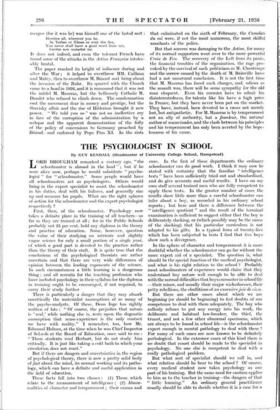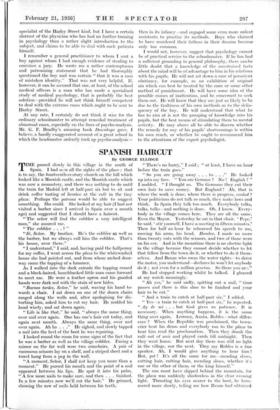THE PSYCHOLOGIST IN SCHOOL
By GUY KENDALL (Headmaster of University College School, Hampstead)
ORD BROUGHAM remarked a century ago, " the 1.1 schoolmaster is abroad in the land " ; but if he were alive now, perhaps he would substitute " psycho- logist " for " schoolmaster." Some people would have all schoolmasters act as psychologists. Others would bring in the expert specialist to assist the schoolmaster in his duties, deal with his failures, and generally size up and measure his pupils. What are the right spheres of action for the schoolmaster and the expert psychologist respectively ?
First, then, of the schoolmaster. Psychology now takes a definite place in the training of all teachers—so far as they are trained at all ; for in the Public Schools probably not 25 per cent. hold any diploma in the theory and practice of education. Sonic, however, question the value of their studying an intricate and slightly vague science for only a small portion of a single year, of which a good part is devoted to the practice rather than the theory of their craft. It is quite true that the conclusions of the psychological theorists are rather uncertain and that there are very wide differences of opinion between the leading exponents of the science. In such circumstances a little learning is a dangerous thing : and all recruits for the teaching profession who have included psychology in their syllabus for the diploma in training ought to be encouraged, if not required, to carry their study further There is particularly a danger that they may absorb uncritically the materialist assumptions of so many of the psycho-analysts. Of these, Dean Inge has rightly written of late : " Of course, the prejudice that nature is ' real,' while nothing else is, rests upon the dogmatic assumption that sense-experience is the only contact we have with reality." I remember, too, how Mi.
• Edmund Holmes, at the time when he was Chief Inspector of Schools at the Board of Education, once said to me : " These students read Herbart, but do not study him critically. It is just like taking a cold bath to which your circulation does not react."
But if there arc dangers and uncertainties in the region of psychological theory, there is now a pretty solid body of fact about the mind, its normal working and its patho- logy, which can have a definite and useful application in the field of education.
These facts fall into two classes : (1) Those Which relate to the measurement of intelligence ; (2) Abnor- malities' of character and temperament ; their causes and cure. In the first of these departments the ordinary. schoolmaster can do good work. I think it may now be stated with certainty that the familiar " intelligence tests " have been sufficiently tried out and standardised, and do give accurate and useful results. I have on my own staff several trained men who are fully competent to apply these tests. In the greater number of cases the results show little more than a careful schoolmaster can infer about a boy, as recorded in his ordinary school reports ; but here and there a difference between the " intelligence quotient " and the result of the terminal examination is sufficient to suggest either that the boy is deliberately slacking, or (which possibly may be the cause of the slacking) that his particular curriculum is not adapted to his gifts. In a typical form of twenty-five which has been subjected to tests I fmd that five boys show such a divergence.
In the sphere of character and temperament it is more doubtful whether the schoolmaster can go far without the more expert aid of a specialist. The question is, what should be the special function of the medical psychologist, and what is his right relation to the school ? Probably most schoolmasters of experience would claim that they understand boy nature well enough to be • aldle to deal with the normal difficulties thatboYs encounter in School life —their minor, and usually their major wickednesSes, their petty rebellions, the ebullitionS of an excessive joie•de vivre.
But there are other cases about which we are beginning (or should be beginning) to feel doubts of our competence to deal with them adequately. The .boy who sullenly refuses to put any energy into his work, the deliberate and habitual law-breaker, the thief, the truant, and not a few other abnormal specimens, which are always to be found in school life—is the schoolmaster expert enough in mental pathology to deal with these ? For many of such eases are now known to be definitely pathological. In the cxtremer cases of this kind there is no doubt that resort should be made to the speeialist" in psychology. No one else is competent to deal with a really pathological problem.
But what sort of specialist should we call in, and what relation should he bear to the school ? Of course, every medical • student now takes psychology as one part of his training. But the same need for caution applies to him as to the:teacher in training—the dangers of that " little learning." An ordinary general practitioner usually shotild be able to decide whether it is a Case" for a specialist of the Harley_ Street kind,. but I have a certain distrust of the physician who has had no further training in psychology than a rather slight introduction to the subject, and claims to be able to deal such patients himself.
I remember a general practitioner to whom I sent a boy against whom I had enough evidence of stealing to convince a jury. He wrote me a rather contemptuous and patronising statement that he had thoroughly questioned the boy and was certain " that it was a case of mistaken identity." That was not very helpful. If, however, it can be secured that one, at least, of the school medical officers is a man who has made a specialised study of medical psychology, that is probably the best solution—provided' he will not think himself competent to deal with the extreme cases which ought to be sent to Harley Street.
At any rate, I certainly do not think it wise for the ordinary schoolmaster to attempt remedial treatment of abnormal cases, especially on the lines of psycho-analysis. Mr. G. F. Bradby's amusing book Dazonhope gave, I believe, a hardly exaggerated account of a great school in which the headmaster ardently took up psycho-analysis- then in its infancy—and engaged some even more ardent assistants to practise its methods. Boys who claimed to have murdered their fathers. in their dreams became only too common.
I would not, however, suggest that psychology cannot be of practical service to the schoolmaster. If he has had a sufficient grounding in general philosophy, there can be little doubt that a knowledge of the ascertained facts about the mind will be of advantage to him in his relations with his pupils. He will not set down a case of persistent obstinacy, for example, as an, exhibition of original sin which can best be treated by the cane or some other method of punishment. He will have sonic idea of the possible causes of inattention, and be concerned to seek them out. He will know that they arc just as likely to be due to the faultiness of his own methods as to the delin- quency of the boy. He will understand that what he has to aim at is not the pumping of knowledge into his pupils, but the best means of stimulating them to mental activity. He may above all be able to discern whether the remedy for any of his pupils' shortcomings is within his own reach, or whether he ought to recommend him to the attentions of the expert psychologist.















































 Previous page
Previous page